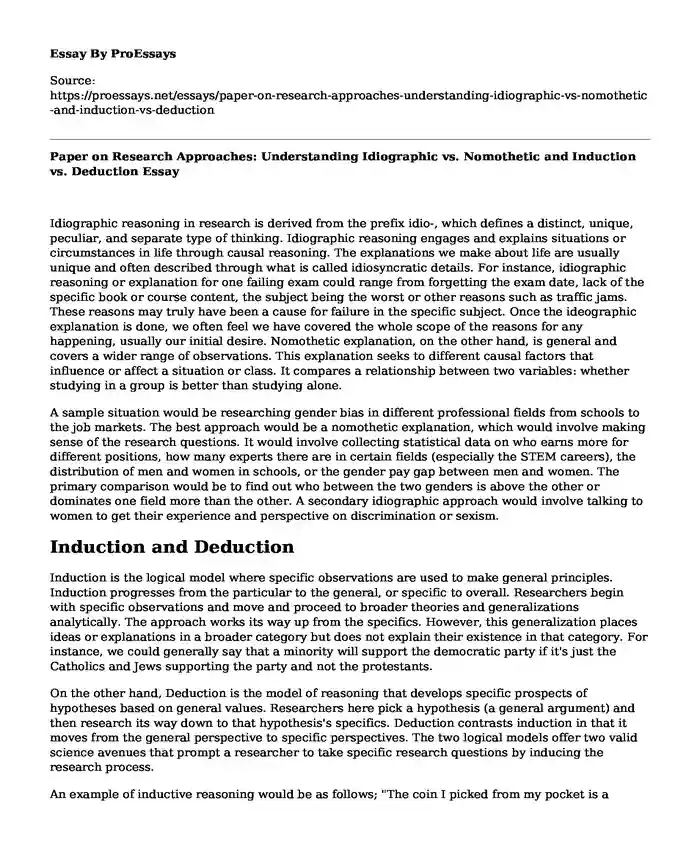Idiographic reasoning in research is derived from the prefix idio-, which defines a distinct, unique, peculiar, and separate type of thinking. Idiographic reasoning engages and explains situations or circumstances in life through causal reasoning. The explanations we make about life are usually unique and often described through what is called idiosyncratic details. For instance, idiographic reasoning or explanation for one failing exam could range from forgetting the exam date, lack of the specific book or course content, the subject being the worst or other reasons such as traffic jams. These reasons may truly have been a cause for failure in the specific subject. Once the ideographic explanation is done, we often feel we have covered the whole scope of the reasons for any happening, usually our initial desire. Nomothetic explanation, on the other hand, is general and covers a wider range of observations. This explanation seeks to different causal factors that influence or affect a situation or class. It compares a relationship between two variables: whether studying in a group is better than studying alone.
A sample situation would be researching gender bias in different professional fields from schools to the job markets. The best approach would be a nomothetic explanation, which would involve making sense of the research questions. It would involve collecting statistical data on who earns more for different positions, how many experts there are in certain fields (especially the STEM careers), the distribution of men and women in schools, or the gender pay gap between men and women. The primary comparison would be to find out who between the two genders is above the other or dominates one field more than the other. A secondary idiographic approach would involve talking to women to get their experience and perspective on discrimination or sexism.
Induction and Deduction
Induction is the logical model where specific observations are used to make general principles. Induction progresses from the particular to the general, or specific to overall. Researchers begin with specific observations and move and proceed to broader theories and generalizations analytically. The approach works its way up from the specifics. However, this generalization places ideas or explanations in a broader category but does not explain their existence in that category. For instance, we could generally say that a minority will support the democratic party if it's just the Catholics and Jews supporting the party and not the protestants.
On the other hand, Deduction is the model of reasoning that develops specific prospects of hypotheses based on general values. Researchers here pick a hypothesis (a general argument) and then research its way down to that hypothesis's specifics. Deduction contrasts induction in that it moves from the general perspective to specific perspectives. The two logical models offer two valid science avenues that prompt a researcher to take specific research questions by inducing the research process.
An example of inductive reasoning would be as follows; "The coin I picked from my pocket is a penny. The coin is certainly a penny. The next coin from my pocket is going to be a penny. Hence, all other coins in my pocket are pennies." An example of deductive reasoning would also be as follows; "Race or gender bias and its impact on access to graduate education; prevalence in racism in the community plays a role in defining how professors at the university treat prospective students that show desire in their research.
Cite this page
Paper on Research Approaches: Understanding Idiographic vs. Nomothetic and Induction vs. Deduction. (2024, Jan 28). Retrieved from https://proessays.net/essays/paper-on-research-approaches-understanding-idiographic-vs-nomothetic-and-induction-vs-deduction
If you are the original author of this essay and no longer wish to have it published on the ProEssays website, please click below to request its removal:
- Which Tools Are Best When Assessing Pain in Dementia Patients
- Essay Sample on Research Methods
- Quantitative Research Methods for Business
- Research Methods in Health Care
- Research Paper on Exploring Relationship between External & Internal Validity in Research Designs
- Paper Sample on Self-Care: Essential Practice for Attitude & Well-Being
- Paper Sample on Importance of SWOT Analysis in Strategic Planning







